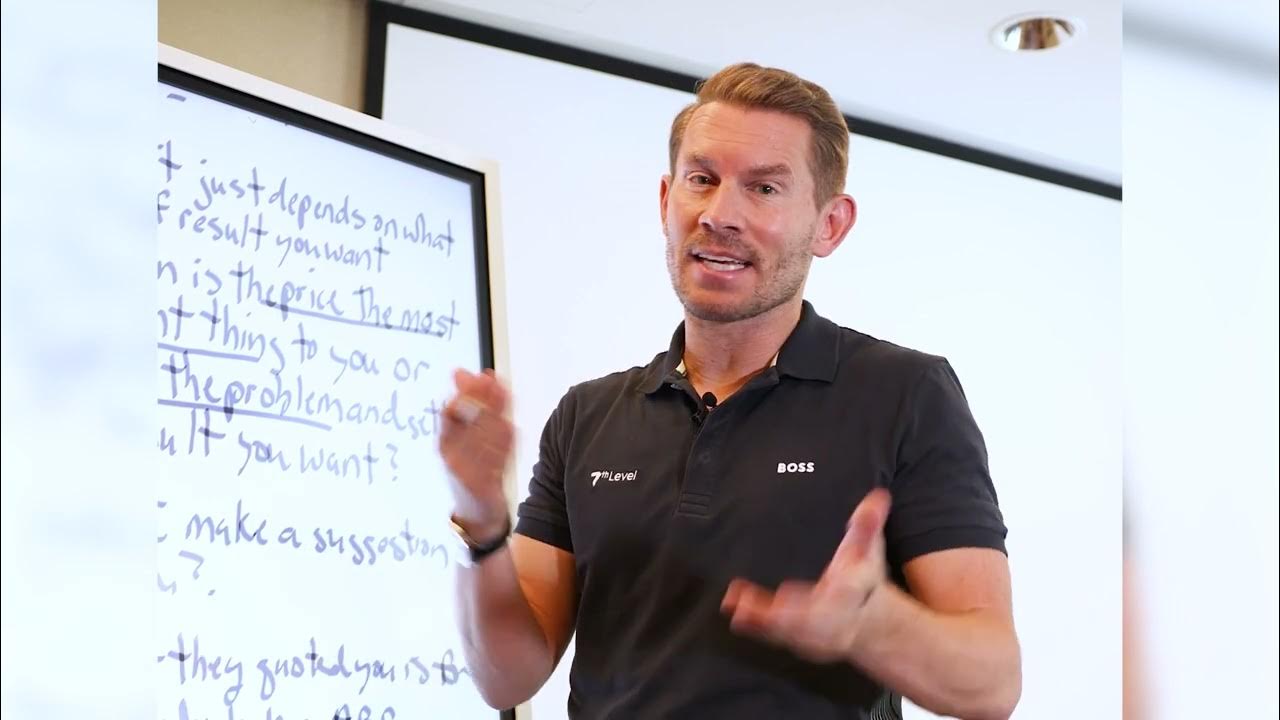27 Words To Avoid In Sales
Summary
TLDRThis sales training video script advises against using 27 specific words that can hinder the sales process. It emphasizes the negative impact of phrases like 'to be honest with you,' 'trust me,' and 'sorry to bother you,' which can undermine credibility and rapport. Instead, the speaker encourages using words that empower the salesperson and build trust, such as 'own' and 'take this home with you.' The script also stresses the importance of not demeaning competitors and the value of offering solutions rather than apologies. It concludes by offering a paid consultation with the speaker's top students for further sales insights.
Takeaways
- 🗣️ Avoid using 'to be honest with you' as it implies previous dishonesty.
- 🙅♂️ Refrain from saying 'trust me' since actions should demonstrate trustworthiness.
- 🙅♀️ Do not apologize for your sales pitch with 'sorry to bother you'; it diminishes your position.
- ⏳ 'Just following up' can trigger resistance; focus on asking effective questions instead.
- 💸 People prefer the action of buying but dislike the word 'buy' due to its cost implications.
- 🏡 Use 'own' or 'take home with you' instead of 'buy' to create a more positive association.
- 📜 The word 'contract' can seem intimidating; consider using 'agreement' or 'paperwork'.
- 📞 Avoid stating the obvious like 'I haven't heard back from you' to prevent creating resistance.
- 🤝 Never put down competitors; instead, let prospects come to their own conclusions.
- 💬 Use casual and conversational language instead of cold, institutional terms like 'individual'.
Q & A
What is the main topic of the video script?
-The main topic of the video script is about words to avoid in sales and closing scenarios to improve sales effectiveness.
Why should 'To be honest with you' be avoided in sales?
-Using 'To be honest with you' implies that the salesperson has not been honest until that point, which can undermine trust and the credibility of the entire conversation.
What is the issue with using 'Trust me' in sales?
-'Trust me' is problematic because it can come across as insincere and may make the prospect feel that they are being manipulated, rather than genuinely being assured of the product's value.
Why does the script suggest avoiding 'Sorry to bother you'?
-Apologizing by saying 'Sorry to bother you' puts the salesperson in a lower status and can make the prospect feel that their time is being wasted, which is counterproductive to building a relationship.
What alternative words are suggested instead of 'Buy'?
-Instead of 'Buy', the script suggests using words like 'Own' or 'Take this home with you', which are less transactional and more appealing to the prospect.
How does the script advise handling the word 'Contract' in sales?
-The script advises against using 'Contract' due to its intimidating connotations. Instead, using 'Agreement' or 'Paperwork' is suggested to make the process feel less formal and more approachable.
What is the recommended approach when a prospect has not responded previously?
-Instead of mentioning that you haven't heard back, the script recommends adding value and not making the prospect feel guilty or embarrassed, focusing on offering something of value in each interaction.
Why should 'Individual' be avoided in sales communication?
-The term 'Individual' is considered cold and institutional, which can create distance in a sales conversation. Using more casual and conversational language is advised.
What is the script's stance on comparing oneself to competitors?
-The script advises against putting down competitors and suggests that it's better to let the prospect come to their own conclusions about the superiority of your product or service.
What is the importance of not apologizing for what you sell?
-Apologizing for what you sell can immediately put you at a lower status and undermine your product's value. It's important to believe in what you're offering and present it with confidence.
How does the script suggest following up with prospects?
-Instead of using 'Just following up', which can trigger resistance, the script suggests asking more effective questions and finding out the real issues or objections the prospect might have.
Outlines

Esta sección está disponible solo para usuarios con suscripción. Por favor, mejora tu plan para acceder a esta parte.
Mejorar ahoraMindmap

Esta sección está disponible solo para usuarios con suscripción. Por favor, mejora tu plan para acceder a esta parte.
Mejorar ahoraKeywords

Esta sección está disponible solo para usuarios con suscripción. Por favor, mejora tu plan para acceder a esta parte.
Mejorar ahoraHighlights

Esta sección está disponible solo para usuarios con suscripción. Por favor, mejora tu plan para acceder a esta parte.
Mejorar ahoraTranscripts

Esta sección está disponible solo para usuarios con suscripción. Por favor, mejora tu plan para acceder a esta parte.
Mejorar ahoraVer Más Videos Relacionados

When Your Competitor is Cheaper | Sales Objection

Stupid Questions Cost You Sales!

The Difference Between Marketing vs Sales - Dan Lok

How I signed 350+ SMMA Clients With 'Poor Lead Quality'

Low Ticket: 10 Hacks Para Aumentar a Conversão do Seu Quiz

How to Build an Audience of Buyers (Not just empty views)
5.0 / 5 (0 votes)
